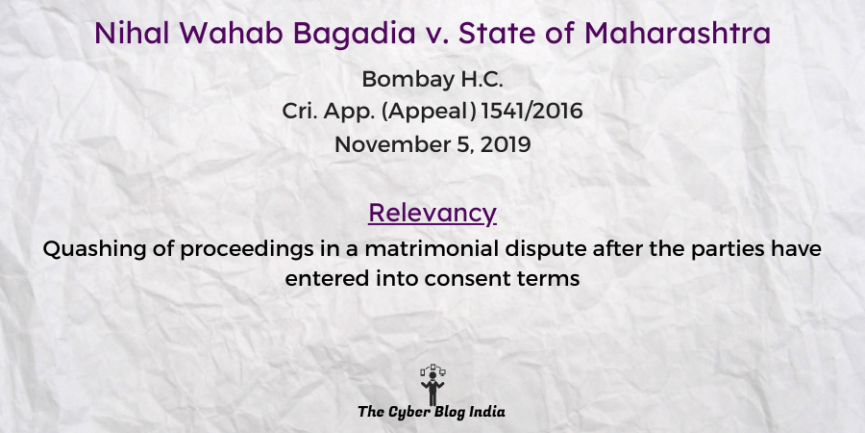Nihal Wahab Bagadia v. State of Maharashtra

Nihal Wahab Bagadia v. State of Maharashtra
In the High Court of Bombay
Cri. App. (Appeal) 1541/2016
Before Justice B.P. Dharmadhikari and Justice S.S. Jadhav
Decided on November 5, 2019
Relevancy of the Case: Quashing of proceedings in a matrimonial dispute after the parties have entered into consent terms
Statutes and Provisions Involved
- The Information Technology Act, 2000 (Section 67, 67A)
- The Indian Penal Code, 1860 (Section 328, 377, 417, 418, 494, 495, 34)
Relevant Facts of the Case
- The applicant husband seeks quashing of proceedings in the dispute that arose out of the matrimonial controversy between him and his wife (respondent number 3).
- The parties entered into the consent terms on September 13, 2014. There were two other persons to the consent terms, namely the applicant’s mother and sister.
- The Division Bench of this court had quashed the proceedings against the co-accused persons by an order dated February 25, 2015.
- At that time, the court did not examine the petitioner’s prayer to quash the proceedings since the question of the constitutionality of Section 377 of the Indian Penal Code, 1860, was pending.
Prominent Arguments by the Advocates
- The petitioner’s counsel submitted the Apex Court had decided on the constitutionality of Section 377, and consensual relationships are now excluded from the scope of the said provision. He further stated that the video relied on by the prosecution does not show any such relation with the complainant. Furthermore, the third person appearing in the video did not have any grievances about the relationship. Further, Section 328 is not applicable as the petitioner did not use or administer any poisonous substance.
- The second and third respondents’ counsel did not dispute the consent terms. However, he submitted that the jurisdiction to withdraw the case is with the state (respondent number 1).
- The public prosecutor supported the submissions of the second and third respondents’ counsel.
Opinion of the Bench
- Parties have continued to accept the consent terms. The Apex Court’s judgement on the constitutionality of Section 377 is not in dispute.
- There is no material on record to indicate an offence under Section 328.
Final Decision
- The court allowed the application.
